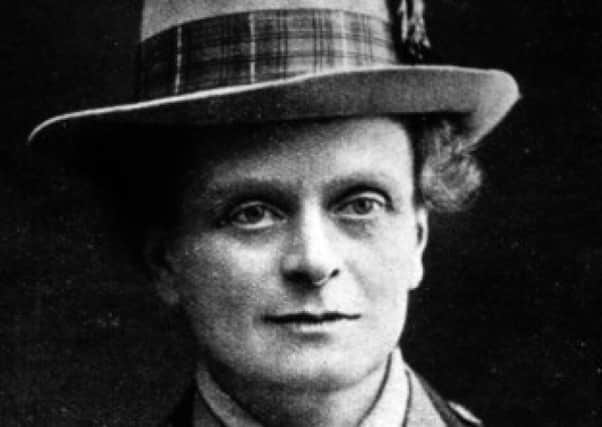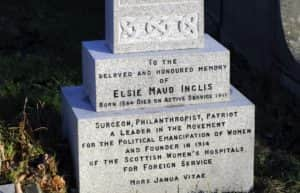Elsie Inglis: Scotland's Florence Nightingale


One of Edinburgh's most distinguished daughters is Doctor Elsie Inglis, who was a pioneering doctor and suffragist during the First World War.
Her tireless efforts to improve medical care for women, and her ground-breaking women's hospitals, have made her a well-known figure. Winston Churchill himself said that she and her nurses would “shine in history”.
Advertisement
Hide AdAdvertisement
Hide AdElsie Inglis was born on 16 August, 1864, in Naini Tal, India. Her father was a member of the Indian Civil Service, and was a passionate advocate for the education of women. Back in Scotland, Elsie was privately educated, and had dreams of attending medical school. However, these dreams were put on hold when her mother died in 1885.


Alan Cumming, author of the Scottish Women's Hospitals website, explains how unusual it was for women to gain a medical education when Elsie was a young woman. “There were only about 50 women doctors in the entire UK at the time,” he says. “The real challenge was trying to find somewhere to study. Often, in the mainstream universities, there were separate classes for women. It was a man's world, and it was very prejudiced against women.”
In 1887, Dr Sophia Jex-Blake founded the Edinburgh School of Medicine for Women, providing Elsie with the opportunity she craved. Cumming sees this as a “key moment” for women in medicine. However, Elsie disagreed with some of Jex-Blake's practices, and founded her own breakaway medical college.
Pioneer
While Elsie was training in Edinburgh and Glasgow, she was shocked by the standard of care available to women, especially to poor women. Cumming provides an example of what women had to deal with at this time.When a woman was unwell, “her husband could get her discharged from hospital to look after the children. It was awful, truly horrendous.” When Elsie was working in the slums of Scotland's big cities, she found that “a lot of women died from irrelevant diseases” because they didn't have access to a high standard of medical care.


In response to this terrible state of affairs, Elsie Inglis founded her own maternity hospital, The Hospice. Her hospital was situated on the Royal Mile, at 219 High Street.
But it was not only this that endeared her to the people of Edinburgh. “Elsie opened her heart to the people,” Cumming says. “She was available almost 24 hours a day.
People would come and see her in the wee hours of the morning. She was really the only one available to the poor of Edinburgh.”
Elsie was also a great supporter of women's suffrage, and was an active member of the Edinburgh National Society for Women's Suffrage.
Advertisement
Hide AdAdvertisement
Hide AdThis allowed her to gain new leadership skills, in addition to her medical training. Alan Cumming says, “She travelled all over Scotland, and all over the UK. This gave Elsie that ability as a spokesperson, and helped her gain confidence. Combined with her medical skills, that was a fantastic combination.”
When the First World War broke out, she was instrumental in setting up an important initiative: the Scottish Women's Hospitals for Foreign Service. Elsie used her connections in the suffrage movement to raise money for the hospitals. However, the War Office did not appreciate her efforts. “She was told by the War Office, 'My good lady, go home and sit still'”, says Cumming. However, Elsie was not deterred, and the French government eventually took up her offer.When they had raised enough funds, the organisation sent teams of female doctors and nurses to Belgium, France, Russia and Serbia. Elsie established a unit in Serbia at the start of the war. “She sacrificed herself for the Serbian people,” Cumming says. “To this day, I don't know how she managed to do it.”
Death and legacy
After she was captured and repatriated in 1915, Elsie immediately set about organising funds for a women's hospital in Russia. She accompanied the team to Odessa, but was forced to return after just one year, as she was suffering from cancer. She died on 26 November, 1917, just one day after returning to Britain.
Elsie Inglis's legacy continued beyond her death, in the form of the Eslie Inglis Memorial Hospital, a maternity hospital in Edinburgh which opened in 1925.
However, the hospital closed its doors in 1988. In some ways, Edinburgh has appeared to have forgotten Elsie's achievements.
“There are aspects of Edinburgh where things could be done so much more [to remember Elsie],” says Cumming. “In particular, with education. People really don't know that much about her.”
In Serbia, however, Elsie's memory is alive and well. In 2015, the British residence in Belgrade was renamed Elsie Inglis House in her memory.
According to Alan Cumming, Serbia has “never forgotten” Elsie's extraordinary efforts, which saved so many lives during the First World War.